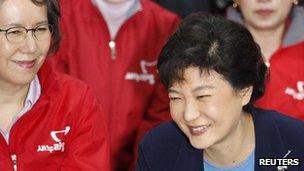South Korea's ruling party holds on to parliament
- Published

The win for the ruling party is a boost for leader and presumed presidential candidate Park Geun-hye
South Korea's ruling Saenuri party has taken the majority of seats in parliamentary polls, winning 152 in the 300-seat national assembly.
That gives the party 25 more than the opposition Democratic United Party (DUP), which had earlier been tipped to win the election.
In a statement, President Lee Myung-bak said people had made "wise choices".
The vote is being seen as a key test for the leader ahead of presidential elections later this year.
"The government will do its best to take care of state affairs and the livelihood of ordinary people in a stable manner and to push ahead with policies for the sake of national interests and the future," Mr Lee said in his statement.
The conservative Saenuri party struggled to hold on to its majority, shedding 13 seats, but did just enough to hold onto power.
DUP official Park Sun-sook conceded defeat and apologised to supporters for "disappointing" them.
"The DUP failed to turn public calls for punishing the... ruling party into reality," she told reporters.
The wafer-thin majority secured by the governing party will have an important psychological effect, as South Korea prepares for a new round of elections - presidential this time - in December, says the BBC's Lucy Williamson in Seoul.
Opposition mistakes
Turnout was 54.3% compared to 46.1% four years ago, according to election officials.
Voters directly elected 246 members of parliament, with the rest chosen by proportional representation.
Saenuri (New Frontier Party) had 165 seats in the outgoing parliament, while the liberal opposition DUP had 89 seats.
Early in the race, the DUP was tipped to win, with analysts citing Mr Lee's unpopular pro-business policies as a reason.
But opposition mistakes involving its choice of candidates resulted in gains for the governing party, some analysts said.
A planned rocket launch by North Korea this week and the possibility of a third nuclear test may have loomed large for the nation recently, but international relations and security issues were seen as having little or no impact on this election.
Voters were more concerned over domestic issues, in particular the growing income gap and inflation, said analysts.
This is the first time in 20 years that the parliamentary and presidential elections have fallen in the same year.
Victory for the pro-business ruling party provides a boost for its leader and presumed presidential candidate Park Geun-hye.
Ms Park is the daughter of the country's former President Park Chung-hee. Her potential rival from the opposition is human rights lawyer Moon Jae-in.
Mr Moon, who served as chief of staff in the office of the late former President Roh Moo-hyun, won a seat in the southern port city of Busan, reported Yonhap news agency.
- Published12 April 2012
- Published2 February 2012
- Published24 October 2011